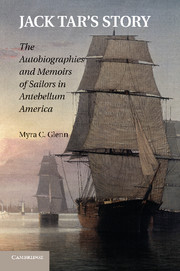Book contents
- Frontmatter
- Contents
- Acknowledgments
- List of Abbreviations
- Introduction: Why Study Antebellum Sailor Narratives
- 1 Stories of Escape, Freedom, and Captivity: Seamen Authors Recall Their Early Years
- 2 Manhood, Nationalism, and Sailor Narratives of British Captivity and the War of 1812
- 3 Exploring the Meaning of Revolution in the Americas: Sailor Narratives of the Haitian and South American Wars of Independence
- 4 Defending One's Rights as a Man and an American Citizen: Sailor Narratives as Exposés of Flogging
- 5 Straddling Conflicting Notions of Masculinity: Sailor Narratives as Stories of Roistering and Religious Conversion
- Afterword
- Appendix
- Index
5 - Straddling Conflicting Notions of Masculinity: Sailor Narratives as Stories of Roistering and Religious Conversion
Published online by Cambridge University Press: 05 October 2010
- Frontmatter
- Contents
- Acknowledgments
- List of Abbreviations
- Introduction: Why Study Antebellum Sailor Narratives
- 1 Stories of Escape, Freedom, and Captivity: Seamen Authors Recall Their Early Years
- 2 Manhood, Nationalism, and Sailor Narratives of British Captivity and the War of 1812
- 3 Exploring the Meaning of Revolution in the Americas: Sailor Narratives of the Haitian and South American Wars of Independence
- 4 Defending One's Rights as a Man and an American Citizen: Sailor Narratives as Exposés of Flogging
- 5 Straddling Conflicting Notions of Masculinity: Sailor Narratives as Stories of Roistering and Religious Conversion
- Afterword
- Appendix
- Index
Summary
In the spring of 1840, the brother of well-known abolitionist and temperance advocate William Lloyd Garrison was at the brink of suicide. James Holley Garrison's alcoholism had destroyed his health and his sixteen-year career as a sailor. By December 1839 he became so incapacitated by drink that his brother pleaded with Secretary of the Navy James Kirk Paulding to release James from naval service. No doubt this must have been a particularly difficult task for William since Paulding was a public defender of slavery.
Shortly after his dismissal from the navy, James began writing penitential reminiscences about his misspent life that he significantly entitled his “confessions.” He recalled his numerous drunken bouts on shore leave and how they led to gambling, whoring, theft, and imprisonment. He also recollected suffering repeated whippings and confinement in irons in the navy because of drunkenness. Finally, James detailed the horrors of delirium tremens and admitted several attempts to commit suicide. Toward the end of his life, when he was cared for by different relatives, especially William, James confessed his anguish and yearned for death: “I feel that my constitution is broken, and my frame debilitated, … I do not wish to live under such existing circumstances. … (Merrill, 112).” Forty-one-year-old James Holley Garrison finally died in his brother's home on October 14, 1842.
- Type
- Chapter
- Information
- Jack Tar's StoryThe Autobiographies and Memoirs of Sailors in Antebellum America, pp. 144 - 174Publisher: Cambridge University PressPrint publication year: 2010



